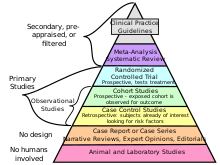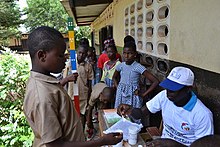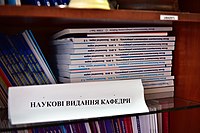User talk:Sj/2018
2018
[edit]Facto Post – Issue 8 – 15 January 2018
[edit]Facto Post – Issue 8 – 15 January 2018
 Metadata on the March[edit]From the days of hard-copy liner notes on music albums, metadata have stood outside a piece or file, while adding to understanding of where it comes from, and some of what needs to be appreciated about its content. In the GLAM sector, the accumulation of accurate metadata for objects is key to the mission of an institution, and its presentation in cataloguing. Today Wikipedia turns 17, with worlds still to conquer. Zooming out from the individual GLAM object to the ontology in which it is set, one such world becomes apparent: GLAMs use custom ontologies, and those introduce massive incompatibilities. From a recent article by sadads, we quote the observation that "vocabularies needed for many collections, topics and intellectual spaces defy the expectations of the larger professional communities." A job for the encyclopedist, certainly. But the data-minded Wikimedian has the advantages of Wikidata, starting with its multilingual data, and facility with aliases. The controlled vocabulary — sometimes referred to as a "thesaurus" as term of art — simplifies search: if a "spade" must be called that, rather than "shovel", it is easier to find all spade references. That control comes at a cost.   Case studies in that article show what can lie ahead. The schema crosswalk, in jargon, is a potential answer to the GLAM Babel of proliferating and expanding vocabularies. Even if you have no interest in Wikidata as such, simply vocabularies V and W, if both V and W are matched to Wikidata, then a "crosswalk" arises from term v in V to w in W, whenever v and w both match to the same item d in Wikidata. For metadata mobility, match to Wikidata. It's apparently that simple: infrastructure requirements have turned out, so far, to be challenges that can be met. Links[edit]
Editor Charles Matthews, for ContentMine. Please leave feedback for him. Back numbers are here. Reminder: WikiFactMine pages on Wikidata are at WD:WFM. If you wish to receive no further issues of Facto Post, please remove your name from our mailing list. Alternatively, to opt out of all massmessage mailings, you may add Category:Wikipedians who opt out of message delivery to your user talk page.
Newsletter delivered by MediaWiki message delivery |
MediaWiki message delivery (talk) 12:38, 15 January 2018 (UTC)
Nomination for deletion of Template:Graph:Most Expensive Books
[edit]![]() Template:Graph:Most Expensive Books has been nominated for deletion. You are invited to comment on the discussion at the template's entry on the Templates for discussion page. {{3x|p}}ery (talk) 16:03, 4 February 2018 (UTC)
Template:Graph:Most Expensive Books has been nominated for deletion. You are invited to comment on the discussion at the template's entry on the Templates for discussion page. {{3x|p}}ery (talk) 16:03, 4 February 2018 (UTC)
Facto Post – Issue 9 – 5 February 2018
[edit]Facto Post – Issue 9 – 5 February 2018
 Wikidata as Hub[edit]One way of looking at Wikidata relates it to the semantic web concept, around for about as long as Wikipedia, and realised in dozens of distributed Web institutions. It sees Wikidata as supplying central, encyclopedic coverage of linked structured data, and looks ahead to greater support for "federated queries" that draw together information from all parts of the emerging network of websites.  Another perspective might be likened to a photographic negative of that one: Wikidata as an already-functioning Web hub. Over half of its properties are identifiers on other websites. These are Wikidata's "external links", to use Wikipedia terminology: one type for the DOI of a publication, another for the VIAF page of an author, with thousands more such. Wikidata links out to sites that are not nominally part of the semantic web, effectively drawing them into a larger system. The crosswalk possibilities of the systematic construction of these links was covered in Issue 8. Wikipedia:External links speaks of them as kept "minimal, meritable, and directly relevant to the article." Here Wikidata finds more of a function. On viaf.org one can type a VIAF author identifier into the search box, and find the author page. The Wikidata Resolver tool, these days including Open Street Map, Scholia etc., allows this kind of lookup. The hub tool by maxlath takes a major step further, allowing both lookup and crosswalk to be encoded in a single URL. Links[edit]
Editor Charles Matthews, for ContentMine. Please leave feedback for him. Back numbers are here. Reminder: WikiFactMine pages on Wikidata are at WD:WFM. If you wish to receive no further issues of Facto Post, please remove your name from our mailing list. Alternatively, to opt out of all massmessage mailings, you may add Category:Wikipedians who opt out of message delivery to your user talk page.
Newsletter delivered by MediaWiki message delivery |
MediaWiki message delivery (talk) 11:50, 5 February 2018 (UTC)
Facto Post – Issue 10 – 12 March 2018
[edit]Facto Post – Issue 10 – 12 March 2018
 Milestone for mix'n'match[edit]Around the time in February when Wikidata clicked past item Q50000000, another milestone was reached: the mix'n'match tool uploaded its 1000th dataset. Concisely defined by its author, Magnus Manske, it works "to match entries in external catalogs to Wikidata". The total number of entries is now well into eight figures, and more are constantly being added: a couple of new catalogs each day is normal. Since the end of 2013, mix'n'match has gradually come to play a significant part in adding statements to Wikidata. Particularly in areas with the flavour of digital humanities, but datasets can of course be about practically anything. There is a catalog on skyscrapers, and two on spiders. These days mix'n'match can be used in numerous modes, from the relaxed gamified click through a catalog looking for matches, with prompts, to the fantastically useful and often demanding search across all catalogs. I'll type that again: you can search 1000+ datasets from the simple box at the top right. The drop-down menu top left offers "creation candidates", Magnus's personal favourite. m:Mix'n'match/Manual for more. For the Wikidatan, a key point is that these matches, however carried out, add statements to Wikidata if, and naturally only if, there is a Wikidata property associated with the catalog. For everyone, however, the hands-on experience of deciding of what is a good match is an education, in a scholarly area, biographical catalogs being particularly fraught. Underpinning recent rapid progress is an open infrastructure for scraping and uploading. Congratulations to Magnus, our data Stakhanovite! Links[edit]
Editor Charles Matthews, for ContentMine. Please leave feedback for him. Back numbers are here. Reminder: WikiFactMine pages on Wikidata are at WD:WFM. If you wish to receive no further issues of Facto Post, please remove your name from our mailing list. Alternatively, to opt out of all massmessage mailings, you may add Category:Wikipedians who opt out of message delivery to your user talk page.
Newsletter delivered by MediaWiki message delivery |
MediaWiki message delivery (talk) 12:26, 12 March 2018 (UTC)
Facto Post – Issue 11 – 9 April 2018
[edit]Facto Post – Issue 11 – 9 April 2018
 The 100 Skins of the Onion[edit]Open Citations Month, with its eminently guessable hashtag, is upon us. We should be utterly grateful that in the past 12 months, so much data on which papers cite which other papers has been made open, and that Wikidata is playing its part in hosting it as "cites" statements. At the time of writing, there are 15.3M Wikidata items that can do that. Pulling back to look at open access papers in the large, though, there is is less reason for celebration. Access in theory does not yet equate to practical access. A recent LSE IMPACT blogpost puts that issue down to "heterogeneity". A useful euphemism to save us from thinking that the whole concept doesn't fall into the realm of the oxymoron. Some home truths: aggregation is not content management, if it falls short on reusability. The PDF file format is wedded to how humans read documents, not how machines ingest them. The salami-slicer is our friend in the current downloading of open access papers, but for a better metaphor, think about skinning an onion, laboriously, 100 times with diminishing returns. There are of the order of 100 major publisher sites hosting open access papers, and the predominant offer there is still a PDF.  From the discoverability angle, Wikidata's bibliographic resources combined with the SPARQL query are superior in principle, by far, to existing keyword searches run over papers. Open access content should be managed into consistent HTML, something that is currently strenuous. The good news, such as it is, would be that much of it is already in XML. The organisational problem of removing further skins from the onion, with sensible prioritisation, is certainly not insuperable. The CORE group (the bloggers in the LSE posting) has some answers, but actually not all that is needed for the text and data mining purposes they highlight. The long tail, or in other words the onion heart when it has become fiddly beyond patience to skin, does call for a pis aller. But the real knack is to do more between the XML and the heart. Links[edit]
Editor Charles Matthews, for ContentMine. Please leave feedback for him. Back numbers are here. Reminder: WikiFactMine pages on Wikidata are at WD:WFM. If you wish to receive no further issues of Facto Post, please remove your name from our mailing list. Alternatively, to opt out of all massmessage mailings, you may add Category:Wikipedians who opt out of message delivery to your user talk page.
Newsletter delivered by MediaWiki message delivery |
MediaWiki message delivery (talk) 16:25, 9 April 2018 (UTC)
Courses Modules are being deprecated
[edit]Hello,
Your account is currently configured with an education program flag. This system (the Courses system) is being deprecated. As such, your account will soon be updated to remove these no longer supported flags. For details on the changes, and how to migrate to using the replacement system (the Programs and Events Dashboard) please see Wikipedia:Education noticeboard/Archive 18#NOTICE: EducationProgram extension is being deprecated.
Thank you! Sent by: xaosflux 20:28, 8 March 2018 (UTC)
Invitation to WikiProject Portals
[edit]The Portals WikiProject has been rebooted.
You are invited to join, and participate in the effort to revitalize and improve the Portal system and all the portals in it.
There are sections on the WikiProject page dedicated to tasks (including WikiGnome tasks too), and areas on the talk page for discussing the improvement and automation of the various features of portals.
Many complaints have been lodged in the RfC to delete all portals, pointing out their various problems. They say that many portals are not maintained, or have fallen out of date, are useless, etc. Many of the !votes indicate that the editors who posted them simply don't believe in the potential of portals anymore.
It's time to change all that. Let's give them reasons to believe in portals, by revitalizing them.
The best response to a deletion nomination is to fix the page that was nominated. The further underway the effort is to improve portals by the time the RfC has run its course, the more of the reasons against portals will no longer apply. RfCs typically run 30 days. There are 19 days left in this one. Let's see how many portals we can update and improve before the RfC is closed, and beyond.
A healthy WikiProject dedicated to supporting and maintaining portals may be the strongest argument of all not to delete.
We may even surprise ourselves and exceed all expectations. Who knows what we will be able to accomplish in what may become the biggest Wikicollaboration in years.
Let's do this.
See ya at the WikiProject!
Sincerely, — The Transhumanist 10:24, 21 April 2018 (UTC)
Pesticide topics
[edit]The Arbitration Committee has authorised discretionary sanctions to be used for pages regarding all pages relating to genetically modified organisms, commercially produced agricultural chemicals and the companies that produce them, broadly construed, a topic which you have edited. The Committee's decision is here.
- Like the template says, this isn't implying any wrong doing at all. There's just a bit of history with the topic related to ArbCom in those links that show where editors can easily get caught up in some of the restrictions like 1RR, etc., so just giving you a courtesy heads up like I try to do for editors new to the topic. Kingofaces43 (talk) 02:25, 27 April 2018 (UTC)
- Thanks, Kingofaces, I realize the sensitivity of the topic, though I didn't realize it was from the old GMO guidance. – SJ + 02:29, 27 April 2018 (UTC)
Please comment on Wikipedia talk:Conflict of interest
[edit]The feedback request service is asking for participation in this request for comment on Wikipedia talk:Conflict of interest. Legobot (talk) 04:28, 16 May 2018 (UTC)
Orphaned non-free image File:Battling Bastards of Bataan logo.jpg
[edit]
Thanks for uploading File:Battling Bastards of Bataan logo.jpg. The image description page currently specifies that the image is non-free and may only be used on Wikipedia under a claim of fair use. However, the image is currently not used in any articles on Wikipedia. If the image was previously in an article, please go to the article and see why it was removed. You may add it back if you think that that will be useful. However, please note that images for which a replacement could be created are not acceptable for use on Wikipedia (see our policy for non-free media).
Note that any non-free images not used in any articles will be deleted after seven days, as described in section F5 of the criteria for speedy deletion. Thank you. --B-bot (talk) 17:12, 16 May 2018 (UTC)
Thank you very much
[edit]The RfC discussion to eliminate portals was closed May 12, with the statement "There exists a strong consensus against deleting or even deprecating portals at this time." This was made possible because you and others came to the rescue. Thank you for speaking up.
By the way, the current issue of the Signpost features an article with interviews about the RfC and the Portals WikiProject.
I'd also like to let you know that the Portals WikiProject is working hard to make sure your support of portals was not in vain. Toward that end, we have been working diligently to innovate portals, while building, updating, upgrading, and maintaining them. The project has grown to 80 members so far, and has become a beehive of activity.
Our two main goals at this time are to automate portals (in terms of refreshing, rotating, and selecting content), and to develop a one-page model in order to make obsolete and eliminate most of the 150,000 subpages from the portal namespace by migrating their functions to the portal base pages, using technologies such as selective transclusion. Please feel free to join in on any of the many threads of development at the WikiProject's talk page, or just stop by to see how we are doing. If you have any questions about portals or portal development, that is the best place to ask them.
If you would like to keep abreast of developments on portals, keep in mind that the project's members receive updates on their talk pages. The updates are also posted here, for your convenience.
Again, we can't thank you enough for your support of portals, and we hope to make you proud of your decision. Sincerely, — The Transhumanist 10:02, 25 May 2018 (UTC)
P.S.: if you reply to this message, please {{ping}} me. Thank you. -TT
Facto Post – Issue 12 – 28 May 2018
[edit]Facto Post – Issue 12 – 28 May 2018
 ScienceSource funded[edit]The Wikimedia Foundation announced full funding of the ScienceSource grant proposal from ContentMine on May 18. See the ScienceSource Twitter announcement and 60 second video.
The proposal includes downloading 30,000 open access papers, aiming (roughly speaking) to create a baseline for medical referencing on Wikipedia. It leaves open the question of how these are to be chosen. The basic criteria of WP:MEDRS include a concentration on secondary literature. Attention has to be given to the long tail of diseases that receive less current research. The MEDRS guideline supposes that edge cases will have to be handled, and the premature exclusion of publications that would be in those marginal positions would reduce the value of the collection. Prophylaxis misses the point that gate-keeping will be done by an algorithm. Two well-known but rather different areas where such considerations apply are tropical diseases and alternative medicine. There are also a number of potential downloading troubles, and these were mentioned in Issue 11. There is likely to be a gap, even with the guideline, between conditions taken to be necessary but not sufficient, and conditions sufficient but not necessary, for candidate papers to be included. With around 10,000 recognised medical conditions in standard lists, being comprehensive is demanding. With all of these aspects of the task, ScienceSource will seek community help. Links[edit]
Editor Charles Matthews, for ContentMine. Please leave feedback for him. Back numbers are here. Reminder: WikiFactMine pages on Wikidata are at WD:WFM. ScienceSource pages will be announced there, and in this mass message. If you wish to receive no further issues of Facto Post, please remove your name from our mailing list. Alternatively, to opt out of all massmessage mailings, you may add Category:Wikipedians who opt out of message delivery to your user talk page.
Newsletter delivered by MediaWiki message delivery |
MediaWiki message delivery (talk) 10:16, 28 May 2018 (UTC)
Facto Post – Issue 13 – 29 May 2018
[edit]Facto Post – Issue 13 – 29 May 2018
 The Editor is Charles Matthews, for ContentMine. Please leave feedback for him, on his User talk page.
To subscribe to Facto Post go to Wikipedia:Facto Post mailing list. For the ways to unsubscribe, see the footer.
Facto Post enters its second year, with a Cambridge Blue (OK, Aquamarine) background, a new logo, but no Cambridge blues. On-topic for the ScienceSource project is a project page here. It contains some case studies on how the WP:MEDRS guideline, for the referencing of articles at all related to human health, is applied in typical discussions. Close to home also, a template, called {{medrs}} for short, is used to express dissatisfaction with particular references. Technology can help with patrolling, and this Petscan query finds over 450 articles where there is at least one use of the template. Of course the template is merely suggesting there is a possible issue with the reliability of a reference. Deciding the truth of the allegation is another matter. This maintenance issue is one example of where ScienceSource aims to help. Where the reference is to a scientific paper, its type of algorithm could give a pass/fail opinion on such references. It could assist patrollers of medical articles, therefore, with the templated references and more generally. There may be more to proper referencing than that, indeed: context, quite what the statement supported by the reference expresses, prominence and weight. For that kind of consideration, case studies can help. But an algorithm might help to clear the backlog. 
If you wish to receive no further issues of Facto Post, please remove your name from our mailing list. Alternatively, to opt out of all massmessage mailings, you may add Category:Wikipedians who opt out of message delivery to your user talk page.
Newsletter delivered by MediaWiki message delivery |
MediaWiki message delivery (talk) 18:19, 29 June 2018 (UTC)
Please comment on Wikipedia talk:Manual of Style/Biography
[edit]The feedback request service is asking for participation in this request for comment on Wikipedia talk:Manual of Style/Biography. Legobot (talk) 04:26, 16 July 2018 (UTC)
Facto Post – Issue 14 – 21 July 2018
[edit]Facto Post – Issue 14 – 21 July 2018
 The Editor is Charles Matthews, for ContentMine. Please leave feedback for him, on his User talk page.
To subscribe to Facto Post go to Wikipedia:Facto Post mailing list. For the ways to unsubscribe, see the footer.
Officially it is "bridging the gaps in knowledge", with Wikimania 2018 in Cape Town paying tribute to the southern African concept of ubuntu to implement it. Besides face-to-face interactions, Wikimedians do need their power sources.  Facto Post interviewed Jdforrester, who has attended every Wikimania, and now works as Senior Product Manager for the Wikimedia Foundation. His take on tackling the gaps in the Wikimedia movement is that "if we were an army, we could march in a column and close up all the gaps". In his view though, that is a faulty metaphor, and it leads to a completely false misunderstanding of the movement, its diversity and different aspirations, and the nature of the work as "fighting" to be done in the open sector. There are many fronts, and as an eventualist he feels the gaps experienced both by editors and by users of Wikimedia content are inevitable. He would like to see a greater emphasis on reuse of content, not simply its volume. If that may not sound like radicalism, the Decolonizing the Internet conference here organized jointly with Whose Knowledge? can redress the picture. It comes with the claim to be "the first ever conference about centering marginalized knowledge online". 
If you wish to receive no further issues of Facto Post, please remove your name from our mailing list. Alternatively, to opt out of all massmessage mailings, you may add Category:Wikipedians who opt out of message delivery to your user talk page.
Newsletter delivered by MediaWiki message delivery |
MediaWiki message delivery (talk) 06:10, 21 July 2018 (UTC)
Facto Post – Issue 15 – 21 August 2018
[edit]Facto Post – Issue 15 – 21 August 2018
 The Editor is Charles Matthews, for ContentMine. Please leave feedback for him, on his User talk page.
To subscribe to Facto Post go to Wikipedia:Facto Post mailing list. For the ways to unsubscribe, see the footer.
 To grasp the nettle, there are rare diseases, there are tropical diseases and then there are "neglected diseases". Evidently a rare enough disease is likely to be neglected, but neglected disease these days means a disease not rare, but tropical, and most often infectious or parasitic. Rare diseases as a group are dominated, in contrast, by genetic diseases. A major aspect of neglect is found in tracking drug discovery. Orphan drugs are those developed to treat rare diseases (rare enough not to have market-driven research), but there is some overlap in practice with the WHO's neglected diseases, where snakebite, a "neglected public health issue", is on the list. From an encyclopedic point of view, lack of research also may mean lack of high-quality references: the core medical literature differs from primary research, since it operates by aggregating trials. This bibliographic deficit clearly hinders Wikipedia's mission. The ScienceSource project is currently addressing this issue, on Wikidata. Its Wikidata focus list at WD:SSFL is trying to ensure that neglect does not turn into bias in its selection of science papers.
If you wish to receive no further issues of Facto Post, please remove your name from our mailing list. Alternatively, to opt out of all massmessage mailings, you may add Category:Wikipedians who opt out of message delivery to your user talk page.
Newsletter delivered by MediaWiki message delivery |
MediaWiki message delivery (talk) 13:23, 21 August 2018 (UTC)

The article Creating Resources for Empowerment in Action has been proposed for deletion because of the following concern:
small local organization; almost all refsare from its own web site
While all constructive contributions to Wikipedia are appreciated, pages may be deleted for any of several reasons.
You may prevent the proposed deletion by removing the {{proposed deletion/dated}} notice, but please explain why in your edit summary or on the article's talk page.
Please consider improving the page to address the issues raised. Removing {{proposed deletion/dated}} will stop the proposed deletion process, but other deletion processes exist. In particular, the speedy deletion process can result in deletion without discussion, and articles for deletion allows discussion to reach consensus for deletion. DGG ( talk ) 22:20, 23 September 2018 (UTC)
Facto Post – Issue 16 – 30 September 2018
[edit]Facto Post – Issue 16 – 30 September 2018
 The Editor is Charles Matthews, for ContentMine. Please leave feedback for him, on his User talk page.
To subscribe to Facto Post go to Wikipedia:Facto Post mailing list. For the ways to unsubscribe, see the footer.
 In an ideal world ... no, bear with your editor for just a minute ... there would be a format for scientific publishing online that was as much a standard as SI units are for the content. Likewise cataloguing publications would not be onerous, because part of the process would be to generate uniform metadata. Without claiming it could be the mythical free lunch, it might be reasonably be argued that sandwiches can be packaged much alike and have barcodes, whatever the fillings. The best on offer, to stretch the metaphor, is the meal kit option, in the form of XML. Where scientific papers are delivered as XML downloads, you get all the ingredients ready to cook. But have to prepare the actual meal of slow food yourself. See Scholarly HTML for a recent pass at heading off XML with HTML, in other words in the native language of the Web. The argument from real life is a traditional mixture of frictional forces, vested interests, and the classic irony of the principle of unripe time. On the other hand, discoverability actually diminishes with the prolific progress of science publishing. No, it really doesn't scale. Wikimedia as movement can do something in such cases. We know from open access, we grok the Web, we have our own horse in the HTML race, we have Wikidata and WikiJournal, and we have the chops to act. 
If you wish to receive no further issues of Facto Post, please remove your name from our mailing list. Alternatively, to opt out of all massmessage mailings, you may add Category:Wikipedians who opt out of message delivery to your user talk page.
Newsletter delivered by MediaWiki message delivery |
MediaWiki message delivery (talk) 17:57, 30 September 2018 (UTC)
Please comment on Wikipedia:Village pump (policy)
[edit]The feedback request service is asking for participation in this request for comment on Wikipedia:Village pump (policy). Legobot (talk) 04:28, 15 October 2018 (UTC)
Nomination of The Summit Lighthouse for deletion
[edit]A discussion is taking place as to whether the article The Summit Lighthouse is suitable for inclusion in Wikipedia according to Wikipedia's policies and guidelines or whether it should be deleted.
The article will be discussed at Wikipedia:Articles for deletion/The Summit Lighthouse until a consensus is reached, and anyone, including you, is welcome to contribute to the discussion. The nomination will explain the policies and guidelines which are of concern. The discussion focuses on high-quality evidence and our policies and guidelines.
Users may edit the article during the discussion, including to improve the article to address concerns raised in the discussion. However, do not remove the article-for-deletion notice from the top of the article. Wqwt (talk) 22:04, 26 October 2018 (UTC)
Facto Post – Issue 17 – 29 October 2018
[edit]Facto Post – Issue 17 – 29 October 2018
 The Editor is Charles Matthews, for ContentMine. Please leave feedback for him, on his User talk page.
To subscribe to Facto Post go to Wikipedia:Facto Post mailing list. For the ways to unsubscribe, see the footer.
Around 2.7 million Wikidata items have an illustrative image. These files, you might say, are Wikimedia's stock images, and if the number is large, it is still only 5% or so of items that have one. All such images are taken from Wikimedia Commons, which has 50 million media files. One key issue is how to expand the stock. Indeed, there is a tool. WD-FIST exploits the fact that each Wikipedia is differently illustrated, mostly with images from Commons but also with fair use images. An item that has sitelinks but no illustrative image can be tested to see if the linked wikis have a suitable one. This works well for a volunteer who wants to add images at a reasonable scale, and a small amount of SPARQL knowledge goes a long way in producing checklists.  It should be noted, though, that there are currently 53 Wikidata properties that link to Commons, of which P18 for the basic image is just one. WD-FIST prompts the user to add signatures, plaques, pictures of graves and so on. There are a couple of hundred monograms, mostly of historical figures, and this query allows you to view all of them. commons:Category:Monograms and its subcategories provide rich scope for adding more. And so it is generally. The list of properties linking to Commons does contain a few that concern video and audio files, and rather more for maps. But it contains gems such as P3451 for "nighttime view". Over 1000 of those on Wikidata, but as for so much else, there could be yet more. Go on. Today is Wikidata's birthday. An illustrative image is always an acceptable gift, so why not add one? You can follow these easy steps: (i) log in at https://tools.wmflabs.org/widar/, (ii) paste the Petscan ID 6263583 into https://tools.wmflabs.org/fist/wdfist/ and click run, and (iii) just add cake. 
If you wish to receive no further issues of Facto Post, please remove your name from our mailing list. Alternatively, to opt out of all massmessage mailings, you may add Category:Wikipedians who opt out of message delivery to your user talk page.
Newsletter delivered by MediaWiki message delivery |
MediaWiki message delivery (talk) 15:01, 29 October 2018 (UTC)
Facto Post – Issue 18 – 30 November 2018
[edit]Facto Post – Issue 18 – 30 November 2018

- WikiCite issue
GLAM ♥ data — what is a gallery, library, archive or museum without a catalogue? It follows that Wikidata must love librarians. Bibliography supports students and researchers in any topic, but open and machine-readable bibliographic data even more so, outside the silo. Cue the WikiCite initiative, which was meeting in conference this week, in the Bay Area of California.

In fact there is a broad scope: "Open Knowledge Maps via SPARQL" and the "Sum of All Welsh Literature", identification of research outputs, Library.Link Network and Bibframe 2.0, OSCAR and LUCINDA (who they?), OCLC and Scholia, all these co-exist on the agenda. Certainly more library science is coming Wikidata's way. That poses the question about the other direction: is more Wikimedia technology advancing on libraries? Good point.
Wikimedians generally are not aware of the tech background that can be assumed, unless they are close to current training for librarians. A baseline definition is useful here: "bash, git and OpenRefine". Compare and contrast with pywikibot, GitHub and mix'n'match. Translation: scripting for automation, version control, data set matching and wrangling in the large, are on the agenda also for contemporary library work. Certainly there is some possible common ground here. Time to understand rather more about the motivations that operate in the library sector.
- Links
- Wikidata and Libraries: Facilitating Open Knowledge, book chapter by Mairelys Lemus-Rojas, metadata librarian and Lydia Pintscher, Wikidata Product Manager, from Leveraging Wikipedia: Connecting Communities of Knowledge (2018)
- LD4P and WikiCite: Opportunities for collaboration, WikiCite 2018 program abstract, Christine Fernsebner Eslao of Harvard Library Information and Technical Services and Michelle Futornick, Linked Data for Production Program Manager at Stanford University
- Shell Lessons for Librarians, Library Carpentry lesson
- At-risk content on Flickr, blogpost 3 November 2018, Andrew Gray
- Toward an Abstract Wikipedia, recent white paper by Wikidata founder Denny Vrandečić (Google)
Newsletter delivered by MediaWiki message delivery
|} MediaWiki message delivery (talk) 11:20, 30 November 2018 (UTC)
WikiProject Genealogy - newsletter No.6
[edit]Newsletter Nr 6, 2018-12-25, for WikiProject Genealogy (and Wikimedia genealogy project on Meta)
 Participation: This is the sixth newsletter sent by mass mail to members in Wikipedia:WikiProject Genealogy, to everyone who voted a support for establishing a potential Wikimedia genealogy project on meta, and anyone who during the years showed an interest in genealogy on talk pages and likewise. (To discontinue receiving Project Genealogy newsletters, please see below) Now 100 supporters[edit]At 3 December 2018, the list of users who support the potential Wikimedia genealogy project, reached 100! A demo wiki is up and running![edit]You can already now try out the demo for a genealogy wiki at https://tools.wmflabs.org/genealogy/wiki/Main_Page and try out the functions. You will find parts of the 18th Pharao dynasty and other records submitted by the 7 first users, and it would be great if you would add some records. And with those great news we want to wish you a creative New Year 2019!
Cheers from your WikiProject Genealogy coordinator Dan Koehl. To discontinue receiving Project Genealogy newsletters, please remove your name from our mailing list.
Newsletter delivered by MediaWiki message delivery |
Facto Post – Issue 19 – 27 December 2018
[edit]Facto Post – Issue 19 – 27 December 2018
 The Editor is Charles Matthews, for ContentMine. Please leave feedback for him, on his User talk page.
To subscribe to Facto Post go to Wikipedia:Facto Post mailing list. For the ways to unsubscribe, see the footer.
Zotero is free software for reference management by the Center for History and New Media: see Wikipedia:Citing sources with Zotero. It is also an active user community, and has broad-based language support. Besides the handiness of Zotero's warehousing of personal citation collections, the Zotero translator underlies the citoid service, at work behind the VisualEditor. Metadata from Wikidata can be imported into Zotero; and in the other direction the zotkat tool from the University of Mannheim allows Zotero bibliographies to be exported to Wikidata, by item creation. With an extra feature to add statements, that route could lead to much development of the focus list (P5008) tagging on Wikidata, by WikiProjects. There is also a large-scale encyclopedic dimension here. The construction of Zotero translators is one facet of Web scraping that has a strong community and open source basis. In that it resembles the less formal mix'n'match import community, and growing networks around other approaches that can integrate datasets into Wikidata, such as the use of OpenRefine. Looking ahead, the thirtieth birthday of the World Wide Web falls in 2019, and yet the ambition to make webpages routinely readable by machines can still seem an ever-retreating mirage. Wikidata should not only be helping Wikimedia integrate its projects, an ongoing process represented by Structured Data on Commons and lexemes. It should also be acting as a catalyst to bring scraping in from the cold, with institutional strengths as well as resourceful code.
Diversitech, the latest ContentMine grant application to the Wikimedia Foundation, is in its community review stage until January 2.
If you wish to receive no further issues of Facto Post, please remove your name from our mailing list. Alternatively, to opt out of all massmessage mailings, you may add Category:Wikipedians who opt out of message delivery to your user talk page.
Newsletter delivered by MediaWiki message delivery |
MediaWiki message delivery (talk) 19:08, 27 December 2018 (UTC)


